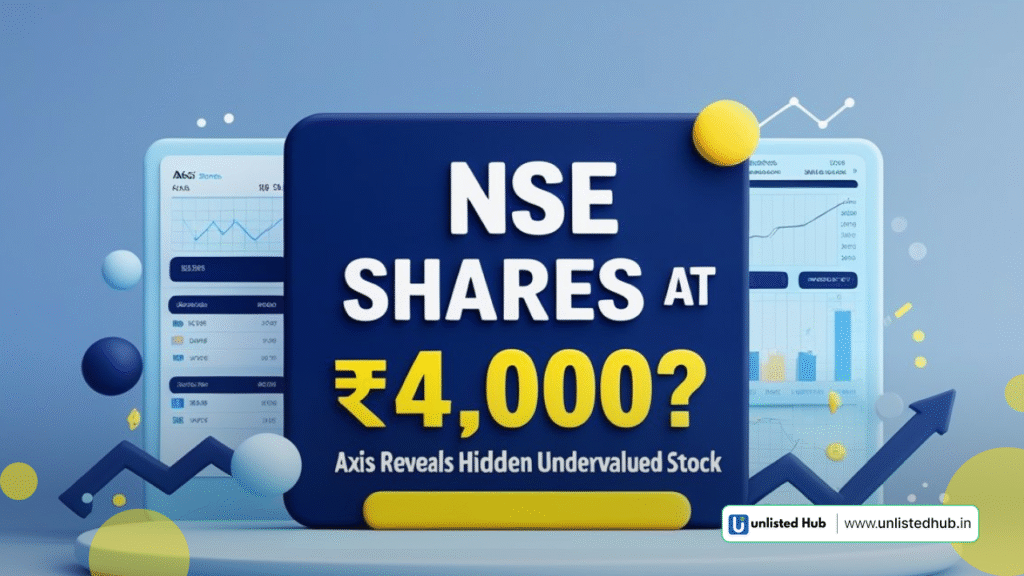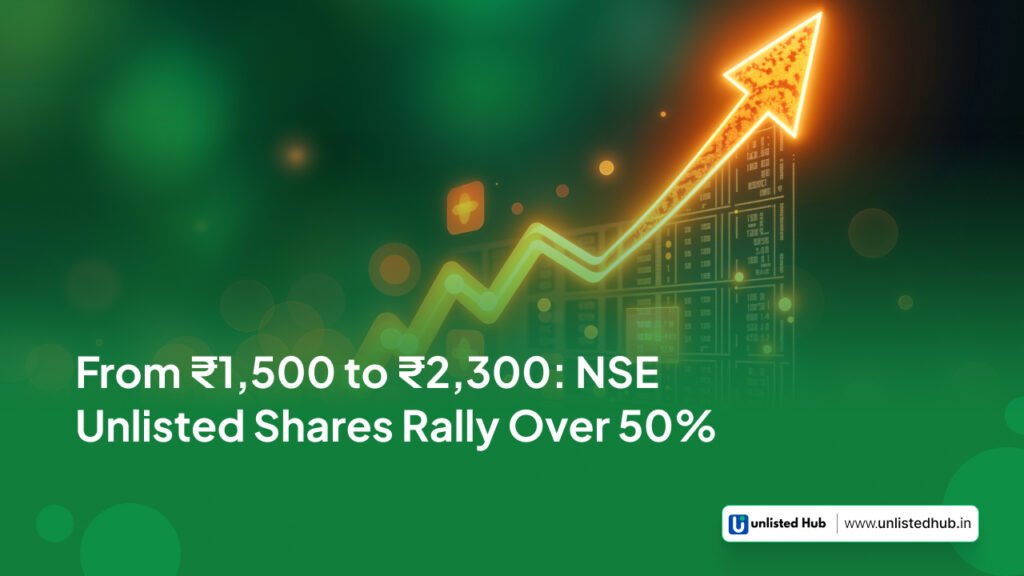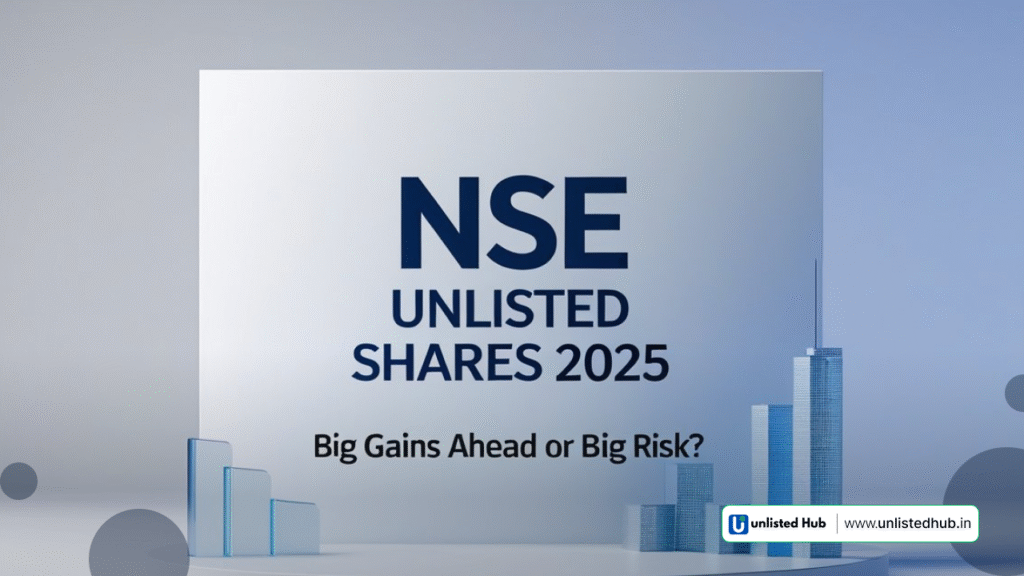Introduction
Axis Securities has valued NSE shares at ₹4,000, calling them deeply undervalued. With NSE’s strong profits and market dominance, investors are showing renewed interest. This bold target has made NSE shares a hot topic in the unlisted space, especially ahead of the company’s much-anticipated IPO.
A) What Are NSE Unlisted Shares and Why Are They in Demand?
When investors hear the name “NSE,” they usually think of the National Stock Exchange, one of the biggest stock exchanges in India. But what many don’t know is that NSE shares are already being bought and sold — even before its IPO. These are called unlisted shares.
Here’s what NSE unlisted shares are and why they’re so popular:
~ What Are NSE Unlisted Shares?
NSE unlisted shares refer to ownership in the National Stock Exchange that is not yet listed on any public stock exchange (like NSE or BSE itself).
These shares are traded in the unlisted market, mostly via brokers and private deals.
They represent a pre-IPO opportunity, meaning investors get in before the official stock market listing.
~ Why Are NSE Shares in Demand?
1. Strong Financials: NSE is India’s largest stock exchange by volume and revenue. Its consistent performance makes NSE shares attractive for long-term investors.
2. Limited Availability: Since the shares are unlisted, there’s a restricted supply. This scarcity naturally increases their demand in the private market.
3. IPO Anticipation: With a highly anticipated IPO expected soon, many believe NSE shares could deliver impressive returns once listed.
4. Early Entry Advantage: Investing before listing can result in significant gains, especially with large, profitable companies like NSE.
5. Reputable Institution: NSE’s credibility and leadership in the capital market add to the trust investors place in its unlisted shares.
B) Axis Securities ₹4,000 Target: What It Means for Investors
When Axis Securities announced a NSE share price target of ₹4,000, it immediately caught the attention of investors in the unlisted space. The valuation, significantly higher than the current market price of NSE shares, hints at a major upside before its expected IPO.
Here’s what this target means for you as an investor:
~ Key Reasons Behind the ₹4,000 Price Target
-
- Strong Business Model: NSE dominates the Indian stock exchange industry, with over 90% share in derivatives trading and leadership in cash equity volumes.
-
- Robust Financials: With high profitability, strong cash flows, and zero debt, NSE shares stand on solid financial ground.
-
- IPO Buzz: The anticipation around NSE’s IPO in 2025–26 makes these shares a magnet for pre-IPO investors.
-
- Growth Potential: Axis sees consistent growth across segments like data services, co-location, and international indices.
~ What This Means for Retail Investors
-
- Entry Opportunity: At the current unlisted price of ₹2,250–₹2,400, there’s an estimated upside of 60–77% to Axis’s ₹4,000 target.
-
- Valuation Arbitrage: The difference between today’s unlisted value and post-listing expectations offers a window to build wealth.
-
- Demand Surge: With institutional and HNI interest growing, NSE shares are becoming increasingly scarce in the unlisted market.
-
- Brand Value: NSE’s dominance and trust factor make it a lower-risk pre-IPO bet for long-term investors.
~ Quick Snapshot: Price vs. Target
| Metric | Current Value | Axis Target |
|---|---|---|
| NSE Share Price (Unlisted) | ₹2,250–₹2,400 | ₹4,000 |
| Potential Upside | – | ~77% |
| Market Sentiment | Positive | Strong Buy |
| IPO Timeline (Expected) | 2025–2026 | – |

C) NSE Unlisted Share Price Trend (2022–2025): What It Reveals
Understanding how NSE Shares have performed in the unlisted market helps investors gauge their timing and valuation outlook. Let’s break down the NSE unlisted share price trend over the last three years.
~ Key Insights from the Price Trend:
-
- NSE Shares gained investor interest consistently due to its strong fundamentals and near-monopoly in the exchange business.
-
- Prices have shown a gradual rise, indicating long-term confidence ahead of the IPO.
-
- Steady demand reflects investor trust in the company’s revenue model and growth prospects.
-
- Regulatory support and digital adoption in trading have further influenced price movements.
~ NSE Share Price Movement Table (2022–2025)
| Year | Price Range (Approx.) | Key Influencing Factor |
|---|---|---|
| 2022 | ₹1,750 – ₹1,900 | FY22 results, IPO discussions |
| 2023 | ₹1,900 – ₹2,150 | Market confidence, SEBI policies |
| 2024 | ₹2,150 – ₹2,350 | Improved revenue, unlisted demand |
| Mid-2025 | ₹2,250 – ₹2,400 | IPO speculation, strong financials |
~ What Investors Can Learn:
-
- The pricing pattern of NSE Shares highlights a cautious yet bullish outlook by early investors.
-
- The lack of major dips reflects low volatility compared to smaller unlisted players.
-
- The consistency in value increase makes it a benchmark for other pre-IPO stocks.
-
- The momentum in NSE Shares is also driven by limited supply and rising institutional interest.
-
- It’s an ideal case study for those tracking pre-IPO price behavior before entering the market.
~ Use Case for Investors:
By tracking how NSE Shares moved between 2022 and 2025, investors can better understand entry points, potential listing gains, and how pre-IPO hype reflects in unlisted pricing. Whether you are new or experienced, keeping a close eye on historical price behavior sharpens your pre-IPO strategy.
D) Is NSE Undervalued Compared to BSE and MCX?
Investors looking at NSE shares often compare them with listed peers like BSE and MCX to determine if they’re getting value for money in the unlisted space. With NSE yet to be listed, many wonder if they’re missing out—or getting in early on a great deal.
Let’s break down the comparison in simple terms:
~ How NSE Stands Against BSE and MCX
-
- Market Leadership: NSE holds a dominant 90%+ market share in equity derivatives, while BSE and MCX operate in smaller, niche segments.
-
- Revenue Base: NSE earns from multiple sources—trading, clearing, data, co-location services—whereas BSE and MCX are more limited.
-
- Profitability: NSE’s margins and net profit are significantly higher than both BSE and MCX.
-
- Valuation Premium: Despite stronger fundamentals, NSE shares in the unlisted market are currently trading at a more attractive valuation multiple.
-
- Growth Prospects: With higher tech investment, broader product lines, and global ambitions, NSE is poised for faster growth.
~ Valuation Comparison Table
| Company | FY24 PAT (₹ Cr) | Market Cap / Estimated Value (₹ Cr) | P/E Ratio | Key Segment |
|---|---|---|---|---|
| NSE | ~7,500 | ~450,000 (unlisted) | ~60 | Equities, Derivatives |
| BSE | ~650 | ~27,000 | ~42 | Equities, SME, StAR MF |
| MCX | ~160 | ~42,000 | ~87 | Commodities, Derivatives |
~ Why NSE Might Be Undervalued
-
- Despite a higher profit base, NSE’s valuation is not significantly higher than BSE or MCX in proportion.
-
- NSE unlisted share valuation suggests there’s room for upside, especially once IPO timelines become clearer.
-
- BSE and MCX are already listed, and their recent price surges might have already priced in near-term growth.
-
- Investors in NSE shares today are essentially betting on a strong listing premium backed by superior fundamentals.
~ Investor Takeaway
-
- If you compare earnings and dominance, NSE shares appear undervalued.
-
- Given their strong fundamentals and leadership, there is a compelling case for pre-IPO investors.
-
- This valuation gap may not last once the listing buzz kicks in, making this the right time to explore NSE shares in the unlisted market.
E) Latest NSE Unlisted Share Deals: What Smart Investors Are Paying
Keeping an eye on recent deals is crucial for anyone considering buying NSE Shares in the unlisted market. In 2025, savvy investors—both retail and institutional—are closely tracking entry points and premium deals to make informed decisions.
Here’s a quick breakdown of what smart investors are doing and what prices they’re paying:
~ Key Observations from Recent Deals
-
- NSE Shares are currently trading in the price range of ₹2,250 to ₹2,400 per share in July 2025. Premium deals above ₹2,400 have also been recorded, particularly for shares with a clean demat transfer trail or long-term holding patterns
-
- Many High Net-Worth Individuals (HNIs) are entering at bulk quantities, indicating strong confidence ahead of the NSE IPO.
-
- The NSE unlisted share latest price reflects stable investor sentiment despite macroeconomic volatility.
-
- Brokers on top unlisted share platforms are facilitating trades with minimum lots starting from 25–50 shares, depending on volume availability.
-
- Premium deals (above ₹2,400) are happening when the seller holds a clean demat transfer trail or long-term holding.
~ Table: July 2025 NSE Unlisted Share Deal Summary
| Buyer Type | Avg. Price Paid | Deal Volume | Notes |
|---|---|---|---|
| Retail Investor | ₹2,250–₹2,300 | 25–50 shares | Direct broker-led deals |
| HNI Investor | ₹2,300–₹2,400 | 500–5,000 | Pre-IPO strategy based investment |
| PMS/Family Office | ₹2,350–₹2,450 | 10,000+ shares | Strategic entry anticipating IPO gains |
~ What This Means for You
-
- If you’re planning to invest in NSE Shares, now is a good time to analyze the average buy-in range and compare it with your target entry price.
-
- Unlike speculative trades, these deal prices reflect a long-term bet on NSE’s growth potential post-IPO.
-
- Investors believe that once listed, NSE Shares could potentially offer significant upside, justifying today’s premiums.
F) Understanding the Hidden Upside: 77% Gain Forecast Explained
When analysts talk about a 77% gain in NSE shares, it isn’t just a number pulled out of thin air. It reflects a deeper analysis of the company’s fundamentals, growth outlook, and current market dynamics. Let’s break it down so investors like you can clearly understand where this optimism comes from.
~ Why the 77% Upside Isn’t Just Hype
-
Current Unlisted Price Range: As of now, NSE shares are available in the unlisted market at around ₹2,250–₹2,400.
-
Axis Securities’ Target: Their research note pegs the fair value of NSE shares at ₹4,000, implying a potential upside of nearly 77%.
-
Financial Strength: NSE’s strong EBITDA margins, healthy RoE, and robust cash flows support this price appreciation.
-
IPO Potential: A public listing could unlock value as institutional demand surges, pushing prices closer to the forecast.
-
Comparative Advantage: NSE is far ahead of peers like BSE and MCX in terms of trading volume, market share, and earnings — reinforcing the NSE share price forecast.
~ What This Means for You
-
Entry Before Listing: Retail investors have a rare chance to buy in before prices catch up with valuation.
-
Low Volatility Pre-IPO: In the unlisted space, prices are more stable than post-IPO, offering some cushion for cautious investors.
-
Demand Surge Coming: Closer to the IPO, interest in NSE shares will likely spike — making early buying potentially rewarding.
-
Value Gaps to Close: Once listed, NSE’s valuation will realign with public comparable, benefiting early shareholders.
~ Snapshot: NSE Share Forecast vs. Current Price
| Metric | Value |
|---|---|
| Current Unlisted Price | ₹2,250 – ₹2,400 |
| Target Price (Axis) | ₹4,000 |
| Expected Upside | ~77% |
| Forecast Source | Axis Securities |
| Sentiment | Strong Buy |
G) How to Buy NSE Unlisted Shares in India in 2025
Investing in NSE shares before they go public can be a smart move—but many investors are unsure about how to get started. Here’s a simplified, step-by-step guide to help you buy NSE unlisted shares in 2025 with clarity and confidence.
~ Step-by-Step Process to Buy NSE Unlisted Shares
-
- 1. Choose a Trusted Unlisted Share Platform Start by selecting a reputed platform or intermediary like Unlisted Hub, which specializes in pre-IPO shares including NSE shares.
-
- 2. Verify Seller Credentials Always check the background and compliance status of the seller or intermediary. Go with SEBI-registered brokers for safety.
-
- 3. Understand the Pricing The price of NSE shares in the unlisted market fluctuates based on demand, financials, and upcoming IPO buzz. As of mid-2025, NSE shares are available in the unlisted market at a price range of approximately ₹2,250 to ₹2,400 per share.
-
- 4. Complete KYC & Documentation You’ll need to submit PAN, Aadhaar, bank proof, and Demat account details to initiate the transaction.
-
- 5. Payment & Allotment Once KYC is approved, you’ll transfer funds and receive the shares in your Demat account via off-market transfer.
-
- 6. Track Company Updates Keep an eye on NSE’s IPO timeline, financial reports, and news to monitor the value of your investment.
~ Key Considerations Before You Invest
-
- Liquidity Is Limited Selling NSE shares before IPO might take time—unlisted markets are not as liquid as the stock exchange.
-
- Minimum Investment Size Some brokers set a minimum ticket size (₹30,000–₹50,000), so be prepared accordingly.
-
- Lock-In After Listing Post-IPO, you might face a lock-in period (usually 6 months for pre-IPO investors).
-
- Tax Implications Unlisted shares are taxed differently than listed stocks—make sure to understand capital gains treatment.
~ Quick Glance: Buying NSE Shares in 2025
| Step | Details |
|---|---|
| Platform | Unlisted Hub or similar |
| Current Market Price | ₹2,250 – ₹2,400 |
| Documents Needed | PAN, Aadhaar, Demat, Bank Proof |
| Holding Method | Off-market transfer to Demat |
| Risk Factor | Medium (due to liquidity and lock-in) |
H) Risks and Rewards of Investing in Unlisted NSE Shares
Investing in NSE Shares before their official listing can offer attractive upside—but not without certain risks. Here’s a detailed breakdown to help investors make an informed decision.
~ Rewards of Investing in NSE Shares
-
- Early Entry Advantage Getting in before the IPO allows investors to purchase NSE Shares at a potentially lower valuation, increasing the chance of higher listing-day gains.
-
- Exposure to a Blue-Chip Brand NSE is India’s largest stock exchange. Owning NSE Shares means investing in a market leader with consistent financial growth.
-
- Long-Term Wealth Creation Since unlisted shares are usually held for the long term, they suit investors seeking steady capital appreciation rather than short-term gains.
-
- Scarcity Creates Value With limited availability, NSE Shares in the unlisted space often become more desirable, especially as IPO buzz builds.
-
- Potential for Institutional Interest As the IPO approaches, interest from institutional investors can further drive up valuation.
~ Risks to Be Aware Of
-
- Lack of Liquidity Unlike listed stocks, NSE Shares in the unlisted market cannot be sold instantly. Finding a buyer takes time and may impact returns.
-
- No Daily Price Transparency Prices of NSE Shares are negotiated off-market, making it harder to track fair value compared to listed stocks.
-
- Regulatory Changes SEBI regulations or IPO delays can impact timelines and expected gains.
-
- Valuation Fluctuations Since valuations are based on buyer-seller sentiment, prices can vary widely until the stock is publicly listed.
-
- Holding Period Risks Lock-in periods may apply post-IPO, restricting investors from exiting immediately.
~ Summary Table: Risk vs Reward
| Factor | Reward | Risk |
|---|---|---|
| Entry Price | Possibly low pre-IPO rate | May be overpriced if market sentiment changes |
| Liquidity | Potential gain after IPO listing | Difficult to exit before IPO |
| Valuation Transparency | Gain from scarcity and demand | No daily market price updates |
| Regulatory Environment | Structured by SEBI rules | Delays or changes can affect timeline |
NSE unlisted stock investment offers great potential, but careful analysis is key before investing.
I) Should You Invest Before the NSE IPO?
The buzz around NSE IPO 2025 is getting louder, and many investors are eyeing NSE Shares in the unlisted market. But is it the right time to invest? Here’s a simplified guide to help you decide.
~ Reasons to Consider Investing in NSE Shares Pre-IPO
-
- Early Mover Advantage Buying NSE Shares before they list could offer a significant upside if the IPO is priced higher than current unlisted valuations.
-
- Backed by Strong Fundamentals NSE is India’s largest stock exchange with solid financials, market dominance, and a tech-driven business model. Long-term investors see this as a stable asset.
-
- High Anticipation Around NSE IPO 2025 With investors and institutions watching closely, the listing could unlock significant value, potentially driving the share price higher.
-
- Scarcity in the Unlisted Market Limited supply of NSE Shares in the grey market means higher demand, which can boost pre-IPO valuations and post-IPO returns.
-
- Strong Historical Performance NSE has shown consistent revenue and profit growth, reinforcing confidence in its future market value.
~ Factors to Think Twice Before Investing
-
- Limited Liquidity Pre-IPO NSE Shares are not easily tradable. Selling them before the IPO can be difficult unless there’s a buyer in the unlisted space.
-
- Uncertain IPO Timeline Although NSE IPO 2025 is expected, timelines may shift due to regulatory or internal factors, delaying your exit plan.
-
- No Daily Price Tracking Prices are negotiated privately, making it tough to monitor fair market value daily.
-
- Risk of Overvaluation If the market gets too excited, there’s a chance of paying a premium that might not hold post-listing.
~ Decision Matrix: Should You Invest Now?
| Question | Yes (Good Sign) | No (Think Again) |
|---|---|---|
| Is the IPO expected in the near term? | NSE IPO 2025 is widely anticipated | Delays are possible |
| Are you ready to hold long-term? | Ideal for long-term wealth creation | Not suited for short-term traders |
| Comfortable with low liquidity pre-IPO? | You’re okay waiting for listing gains | You need immediate liquidity |
| Do you trust NSE’s business fundamentals? | Strong past performance and dominance | Still researching or unsure |
NSE Shares could offer meaningful returns if timed and priced right. Just be sure to assess your own investment horizon and risk tolerance.
J) When Will NSE Unlisted Shares List? Key IPO Timeline You Should Know
Investors who hold or plan to buy NSE Shares often have one major question: When will NSE finally go public? While the company has been preparing for its IPO for a while, the exact timing has been a topic of keen interest in 2025.
Here’s a simplified breakdown of the situation and what you should keep in mind:
~ What’s the Status of NSE’s IPO?
-
- The National Stock Exchange has already filed its Draft Red Herring Prospectus (DRHP) with SEBI.
-
- Regulatory hurdles delayed progress in earlier years, but momentum has picked up in 2025.
-
- Market experts expect the NSE IPO listing date to fall between Q4 2025 and Q1 2026, if SEBI gives timely approvals.
-
- Promoters are aligning internal compliance and demat validations, a sign of readiness for listing.
-
- Investor excitement is fueled by NSE’s strong profitability and its leading position in the Indian stock market.
~ NSE IPO Timeline Snapshot (Estimated)
| Event | Expected Timeline | Status |
|---|---|---|
| DRHP Filing | Already Completed | Done |
| SEBI Review & Approval | Aug–Sept 2025 | In Progress |
| Price Band & RHP Announcement | Oct–Nov 2025 | Expected Soon |
| IPO Launch Window | Nov–Dec 2025 | Targeted Phase |
| Final Listing Date | Dec 2025–Jan 2026 | Awaited |
~ What This Means for NSE Shareholders
-
- If you hold NSE Shares in the unlisted market, you might see improved liquidity and price surge once the IPO is announced.
-
- Those planning to enter now still have a window of opportunity before the listing.
-
- Analysts believe listing could unlock higher valuations, making pre-IPO buying an attractive strategy.
-
- Keep in mind, the schedule might change based on SEBI’s approval process and overall market sentiment.
In short, if you’re tracking NSE Shares, this timeline gives you a fair idea of when you can expect to exit or gain from listing. Staying updated on every regulatory move is key—especially with an IPO of this scale on the horizon.
K) Expert Opinion: Is ₹4,000 a Realistic Target for NSE Shares?
With Axis Securities projecting a bold ₹4,000 NSE shares target price, investors are naturally curious: Is this realistic, or just market hype? Let’s break down what market experts think and what it could mean for you as a retail investor.
~ What Market Experts Say About NSE Shares
-
- Strong Financial Backbone Analysts point out that NSE Shares are backed by India’s most profitable exchange. With consistent growth in revenue and PAT (Profit After Tax), the fundamentals support a potential higher valuation.
-
- Monopoly-like Position in Derivatives NSE commands over 90% of the derivatives market, a cash-generating engine. This dominance strengthens the argument for an upward valuation.
-
- Tech-Driven Growth Experts see NSE as a fintech leader. Its investments in AI, algo-trading, and digital infrastructure are future-focused — a big plus for long-term investors.
-
- Peer Benchmarking Matters When comparing with listed peers like BSE and MCX, analysts feel NSE Shares still trade at a discount, offering room for price appreciation post-IPO.
-
- Previous Valuation Rounds Support the ₹4,000 Estimate Axis Securities isn’t alone — other brokerages have pegged similar or slightly lower targets, based on expected listing P/E multiples and earnings projections.
~ What Could Challenge the ₹4,000 Target?
-
- Regulatory Uncertainty With SEBI tightening norms, there is always a risk that future earnings might be affected, slowing growth.
-
- Delayed IPO Timeline If NSE IPO gets pushed beyond 2025, the unlisted market valuation could remain stagnant for longer than expected.
-
- Overenthusiastic Valuation Experts warn that the ₹4,000 number assumes an optimistic market sentiment. Any volatility in financial markets can delay such targets.
~ Table: Expert Views on NSE Shares Target Price
| Expert/Institution | Price Estimate | Basis of Estimation |
|---|---|---|
| Axis Securities | ₹4,000 | Future P/E multiples & profit growth |
| Independent Analysts | ₹3,600–₹3,800 | Peer comparison & revenue strength |
| Market Observers | ₹3,200–₹3,500 | Conservative estimates with risk buffers |
NSE Shares do show strong potential, and many experts believe ₹4,000 is not far-fetched — especially if the IPO hits the right valuation metrics. 




